recomLine Treponema IgG recomLine Treponema IgM ... - Mikrogen
recomLine Treponema IgG recomLine Treponema IgM ... - Mikrogen
recomLine Treponema IgG recomLine Treponema IgM ... - Mikrogen
You also want an ePaper? Increase the reach of your titles
YUMPU automatically turns print PDFs into web optimized ePapers that Google loves.
NEW<br />
<strong>Treponema</strong> pallidum<br />
<strong>recomLine</strong> <strong>Treponema</strong> <strong>IgG</strong><br />
<strong>recomLine</strong> <strong>Treponema</strong> <strong>IgM</strong><br />
Strip-Immunoassay with antigens produced by recombinant techniques for the detection of <strong>IgG</strong> or <strong>IgM</strong> antibodies<br />
against <strong>Treponema</strong> pallidum<br />
<strong>Treponema</strong> pallidum subsp. pallidum is the causative agent of Syphilis, a<br />
chronic disease occuring only in humans. The disease progresses in several<br />
stages. After a short propagation period at the site of infection (primary stage)<br />
the hematogenic spreading of the pathogen throughout the entire organism<br />
follows (secondary stage). After the decline of acute symptoms <strong>Treponema</strong> pallidum<br />
can persist for years or lifetime in the human organism (stage of latency)<br />
and then can cause late complications (tertiary Syphilis and neurosyphilis).<br />
During pregnancy the pathogen can be transmitted to the fetus (Syphilis connata).<br />
An untreated syphilis can decisively affect the course of pregnancy and<br />
can lead to spontaneous abortion, stillborn or premature birth.<br />
The serologic diagnosis of syphilis intends the use of a sensitive antibody<br />
screening assay (TPHA/TPPA, ELISA) in the first step. In the case of equivocal or<br />
positive results in the screening test a confirmation assay is performed in the<br />
second step to assure the specificity (FTA-ABS, immunoblot). Here the immunoblot<br />
plays a very important role, as only with this technique the determination<br />
of antibody production against essential <strong>Treponema</strong> pallidum antigens is<br />
possible. At the same time the detection of different antibody classes is possible.<br />
With the use of recombinant antigens the <strong>recomLine</strong> <strong>Treponema</strong> <strong>IgG</strong>, <strong>IgM</strong><br />
meets all these requirements perfectly.<br />
Product Advantages<br />
•<br />
•<br />
•<br />
•<br />
•<br />
•<br />
•<br />
•<br />
Recombinant antigens<br />
<br />
<br />
Use of pathogen specific <strong>Treponema</strong> antigens Tp 47, Tp17 and Tp 15 as well as TmpA<br />
Additional safety due to new antigens Tp257 (Gpd) and Tp453 with high specificity for<br />
<strong>Treponema</strong> pallidum<br />
Simple and quick interpretation by two-band criterion<br />
Test procedure and reagents identical in all MIKROGEN strip tests - reagents exchangeable<br />
Control bands on each strip<br />
Separate detection of <strong>IgG</strong> and <strong>IgM</strong> antibodies possible<br />
Easy test procedure; automation possible<br />
Easy and objective evaluation and documentation by recomScan software<br />
CE label: The <strong>recomLine</strong> <strong>Treponema</strong> tests meet the high standard of the EC directive 98/79/EC on in<br />
vitro diagnostic medical devices<br />
Recombinant <strong>Treponema</strong> Antigens<br />
React. Control<br />
<strong>IgG</strong><br />
Conjugate control<br />
<strong>IgM</strong><br />
Cut-off Control<br />
Recombinant Antigen Function Size [kDa]<br />
Tp 47 Membrane protein 47<br />
TmpA Membrane protein 42<br />
Tp257 (Gpd) Glycerophosphodiester-Phosphodiesterase, membrane protein 39<br />
Tp453 Membrane protein 28<br />
Tp 17 Membrane protein 17<br />
Tp 15 Membrane protein 15<br />
Tp47<br />
TmpA<br />
Tp257 (Gpd)<br />
Tp453<br />
Tp17<br />
Tp15
Test Principle and Procedure<br />
Evaluation<br />
E E E<br />
Diagnostic sensitivity<br />
<strong>recomLine</strong> <strong>Treponema</strong><br />
Article-No Storage<br />
5172 <strong>recomLine</strong> <strong>Treponema</strong> <strong>IgG</strong><br />
Reagents for 20 determinations<br />
5173 <strong>recomLine</strong> <strong>Treponema</strong> <strong>IgM</strong><br />
Reagents for 20 determinations<br />
5170 <strong>recomLine</strong> <strong>Treponema</strong> <strong>IgG</strong><br />
Reagents for 100 determinations<br />
5179 <strong>recomLine</strong> <strong>Treponema</strong> <strong>IgM</strong><br />
Reagents for 100 determinations<br />
1 st Incubation A test strip loaded with <strong>Treponema</strong> antigens is incubated<br />
with diluted serum or plasma in a tray for 1 hour<br />
(3 hours as an alternative).<br />
wash 3 times<br />
2 nd Incubation Peroxidase conjugated anti-human antibodies (<strong>IgG</strong> or<br />
<strong>IgM</strong> specific) are added. Incubate for 45 minutes.<br />
wash 3 times<br />
Color reaction 8 minutes after addition of the colouring solution, insoluble<br />
coloured bands develop at the sites on the test<br />
strips occupied by antibodies.<br />
Positive findings in two reference tests<br />
1h Procedure 3h Procedure<br />
<strong>IgG</strong> (n = 280) <strong>IgM</strong> (n = 90) <strong>IgG</strong> (n = 39) <strong>IgM</strong> (n = 38)<br />
Negative 0 0 0 0<br />
Borderline 2 7 1 0<br />
Positive 278 83 38 38<br />
Sensitivity 100 %* 100 %* 100 %* 100 %<br />
* including borderline results<br />
Diagnostic specificity<br />
<strong>recomLine</strong> <strong>Treponema</strong><br />
Blood donors<br />
1h Procedure 3h Procedure<br />
<strong>IgG</strong> (n = 200) <strong>IgM</strong> (n = 199) <strong>IgG</strong> (n = 40) <strong>IgM</strong> (n = 40)<br />
Negative 199 196 40 38<br />
Borderline 1 3 0 2<br />
Positive 0 0 0 0<br />
Specificity 99.5 % 98.5 % 100 % 95 %<br />
At +2°C - +8°C<br />
MIKROGEN GmbH | Floriansbogen 2-4 | 82061 Neuried | Germany | Tel.: +49 89 54801-0 | Fax: +49 89 54801-100<br />
mikrogen@mikrogen.de | www.mikrogen.de<br />
PIRLTPE002_2013-05


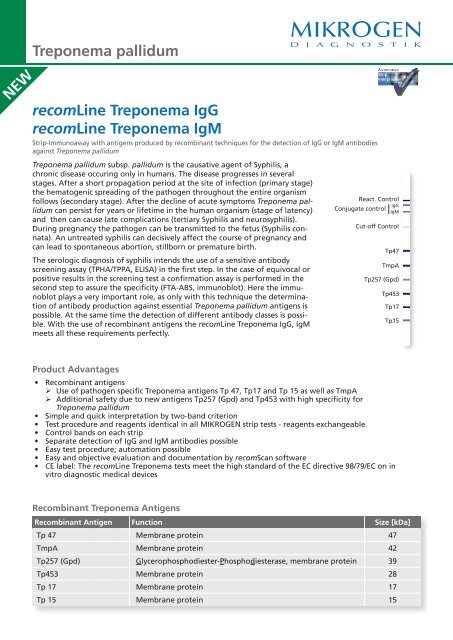
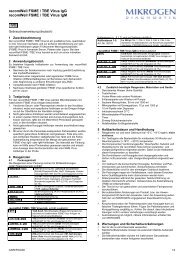
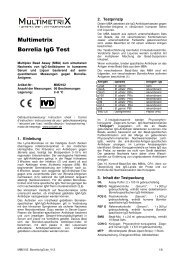
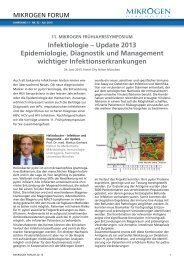

![recomLine EBV IgG [aviditet] [IgA] recomLine EBV IgM - Mikrogen](https://img.yumpu.com/19720026/1/184x260/recomline-ebv-igg-aviditet-iga-recomline-ebv-igm-mikrogen.jpg?quality=85)
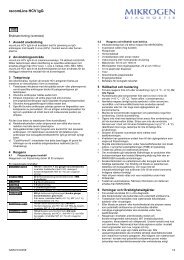
![recomBlot CMV IgG [Avidità] - Mikrogen](https://img.yumpu.com/16294013/1/184x260/recomblot-cmv-igg-avidita-mikrogen.jpg?quality=85)
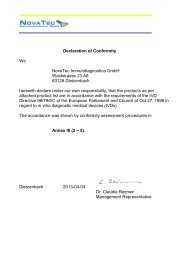
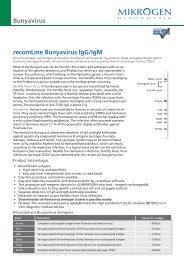
![recomBead Yersinia IgG recomBead Yersinia IgA [IgM] - Mikrogen](https://img.yumpu.com/15461030/1/184x260/recombead-yersinia-igg-recombead-yersinia-iga-igm-mikrogen.jpg?quality=85)
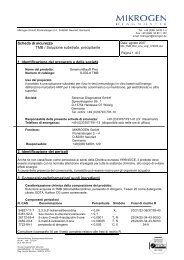
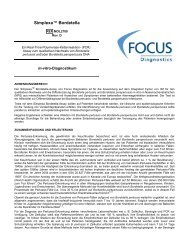
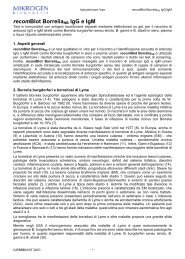
![recomLine EBV IgG [Avidity] [IgA] recomLine EBV IgM ... - Mikrogen](https://img.yumpu.com/6326010/1/184x260/recomline-ebv-igg-avidity-iga-recomline-ebv-igm-mikrogen.jpg?quality=85)